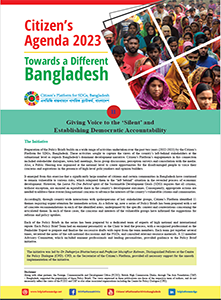 Background and Context
Background and Context
Whilst Bangladesh has achieved commendable success in terms of various socio-economic indicators, there are many challenges the country is having to face in moving forward in the twenty-first century. It needs to be noted and appreciated that non-state actors have played a critically important role in the impressive journey that Bangladesh has undertaken over the post-independence period. Civil society groups, non-government organisations, as also the media of the country, have contributed in various ways in this journey: by raising awareness about issues of concern and development interests to the country, helping with poverty alleviation and improvements in health and nutritional status, offering low-cost health and education solutions, and by helping to identify areas and issues that needed priority attention and actions on the part of the policymakers. Bangladesh’s development track record bears out that when all key stakeholders work jointly in areas of economic development, social empowerment and good governance, and in securing civic rights, both Bangladesh’s economy and the citizens stand to gain from this. As may also be recalled, the SDGs, the implementation of which Bangladesh is committed, talk of a whole-of-society approach. Thus, the state should provide space to non-state actors, encourage constructive criticism, and promote proactive engagement with civic groups.
However, regrettably, in recent times, there has been a backsliding in view of the above. Concerns, as regards the state of democracy, accountability, political rights, and civil liberties, and shrinking political space for civil society organisations (CSOs) and other civil society actors (e.g., lawyers, academics, journalists, and other professional groups), have been on the rise in recent years. The shrinking political space is making it difficult for different groups and individuals to raise their voices in view of the policies and actions pursued by the government. Voices of dissent have also become equally marginalised.
While these concerns have negative implications for all citizens, these are more adverse and alarming, particularly for marginalised groups and the left behind and pushed behind people of the country. In other words, even though the gradual democratic backsliding is affecting various aspects and spheres of public life, in a diverse range of manifestations, it is members of marginalised communities who have to bear disproportionate and adverse consequences. These groups include religious and ethnic minorities in both plain lands and the hills, linguistic minorities, the Dalit community, as well as persons with disabilities, among others. Women belonging to these groups are subjected to intersectional discrimination on the grounds of their gender. Members of the Hijra community and transgender persons are particularly vulnerable and discriminated against.
Against this backdrop, the Policy Brief focuses on key areas of concern in view of the above and comes up with a set of concrete recommendations as to how the democratic accountability system can be strengthened so that ‘silent’ disadvantaged communities can make their voices heard and their issues addressed. A search for actionable initiatives in this backdrop must become part of the mainstream discourse and needs to be attended to with due urgency.
Published: May 2024


Leave A Comment